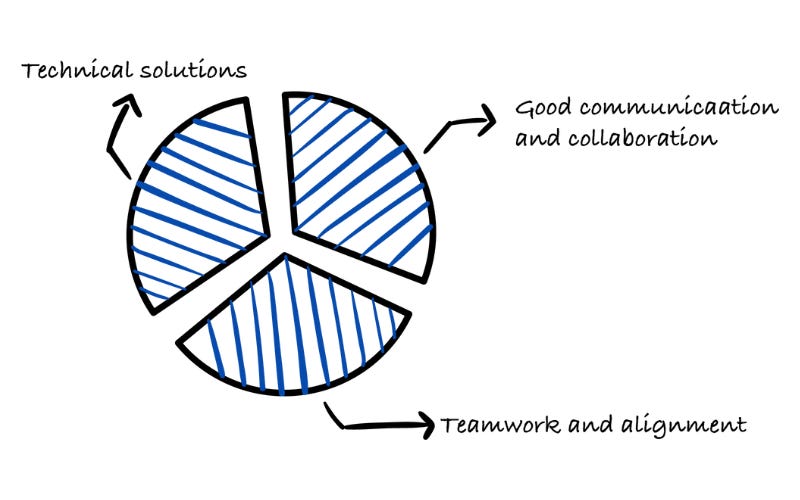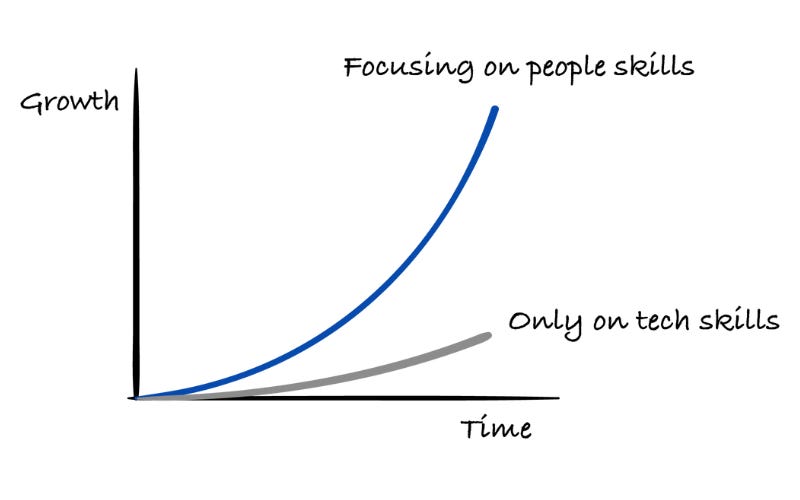Engineering is More About People Than Tech
Spoiler: I assumed that I would just code all day and that's it. Well, I was very wrong!
Intro
A lot of engineers underestimate the importance of people skills. They start learning programming and the assumption is that they will just code all day and there is not going to be any need to talk with anyone.
The reality is different. Engineering is one of the most collaborative fields out there. It’s all about good collaboration, alignment, teamwork and helping each other.
I’ve certainly had this assumption. Let’s get into that next.
I assumed I would just code all day → well I was very wrong
Before I started learning programming, I thought that all that engineers do is code and after they finish whatever they are doing, they call it a day!
No need to talk to customers, project managers, clients or others. My assumption couldn’t be more wrong.
When I first started learning programming I have found real joy in building things + continuously learn and getting better. I would be pretty happy doing just that for the whole day without the need to talk to anyone.
So, when I got my first role as an engineer, I saw what engineers actually do. It was a bit shocking to me, but also in a positive way. I saw the importance of collaboration, alignment and working together with others.
That finding provided me some sort of confidence that this is a field I see myself in long term. Especially, because I was always pretty good with communication and collaboration + teamwork. So now, I can combine my passion for building things and also use my good people skills.
Fast forward a few years. The people skills were actually the skills that made me stand out from other engineers → that’s also why I later thought that management might be a good path for me. I was right!
If you wish to read my full story of how I started my career, you can read it here: Starting my career again as a junior engineer (paid article).
If you wish to read my story how I moved from engineer to manager, you can read it here: From IC to manager (paid article).
Engineering is one of the most collaborative fields out there
There is so much need for collaboration and alignment to effectively deliver solutions that can scale long-term. Just 1 person working in isolation and making decisions will cause a lot more harm than help.
The reason is that for every piece of code we create, someone needs to maintain it. If 1 person is just making isolated decisions → nobody else will know what those decisions were. All of the future changes would depend just on that person.
The goal is to create software that is easy to maintain and adjust based on future needs. And you can only do that with great minds that are working together.
That’s why I like to say:
Software Development is a team sport and great teams build great software. You can have the best and the smartest engineers on the team, but if they don’t work together, they will not be delivering the actual value.
Good people skills shine bright in our industry
You can have the best technical skills in the industry, but if you are not making sure that others learn from you, they will unfortunately not mean that much.
Just changing a few words in your overall mindset makes a HUGE difference.
Changing your mindset from “How can I deliver this solution” to “How can we deliver this solution together and learn from each other” will make an immense difference.
This provides so much more value to the team and the overall organization. So make sure to do that, if you haven’t already.
There are many more detailed examples such as:
You are doing great code reviews
You are treating code reviews as a way to help others and for your learning. You review them swiftly because you wish to unblock your colleague and you rather ask questions instead of providing very direct statements.
You are making sure a new person gets onboarded fast to the team
You take pride in creating a great onboarding experience and you offer extra support to the new person coming in. You understand that it’s not that easy and straight-forward to jump into the new codebase and the team and that’s why you wish to make it as easy as possible.
You are looking at disagreements as a way to find the best solution together
You are not trying to compete or trying to do whatever is possible so that your solution is the actual solution. But you are trying to understand based on pros and cons which would be the right solution objectively. You feel amazing when the team finds the best solution, not if the solution is yours.
You are putting yourself in other people's shoes and understanding their perspective
This is especially important when you are talking with a product manager, a designer, or a customer. You are not only trying to push your wants, but you wish to understand their challenges, their motivation and their wants. That’s how you can map the solution that would fit these perspectives.
You are helping others in need
When you get the feeling that someone is stuck on a particular problem, you offer them help to look through it together. You spending 10 minutes to unblock your colleague, may save a LOT of time and also a whole lot of frustration to your colleague.




